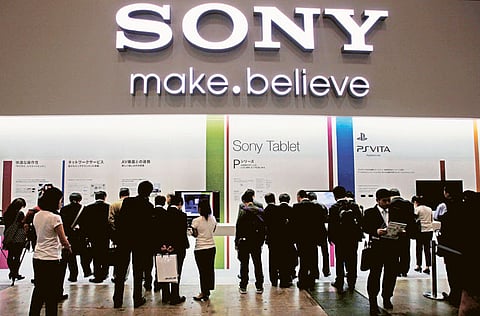Sony, Sharp post $11b loss
Japan's biggest LCD TV makers hit by falling global shipments and stronger yen

Tokyo Sony Corp and Sharp Corp posted a combined 900 billion-yen ($11 billion, Dh40.58 billion) loss as the first decline in global TV shipments in six years and a stronger yen hurt overseas sales at Japan's biggest LCD TV makers.
Sony had a record loss of 520 billion yen for the year ended March 31, more than twice what it had predicted in February, after taking a charge to write down deferred tax assets. Sharp also had a record loss of 380 billion yen, 31 per cent more than its earlier forecast the same month.
The two companies, once symbols of Japan's dominance in electronics, have been hammered by Apple Inc and Samsung Electronics Co, a currency that reached a post-war high and prompted government intervention, and the aftermath of last year's quake and Thai floods.
Sony's new President, Kazuo Hirai, may have to raise equity and cut jobs while Sharp has turned to Taiwan's Foxconn Technology Group for a $1.6 billion (Dh5.87 billion) infusion.
Drastic reforms
"The situation is critical and we will carry out drastic reform. Nothing is sacred," Sony's chief financial officer Masaru Kato said Tuesday.
"Turning around our TV business is a top priority."
Sony's shares in Germany plunged as much as 9.8 per cent, the most in more than three years. Sharp's shares fell 7.9 per cent in Frankfurt.
Sony took a 300 billion-yen charge to write down the value of deferred tax assets as the company no longer expects to be as profitable as it had once forecast. The company may raise financing with equity, according to Kato. It has not made any specific plans to do so, he said.
"Given the tax charges, Sony's revival and growth plans in the US don't seem to be working out," said Satoshi Yuzaki, a general manager at Takagi Securities in Tokyo. "The market is very sceptical about the outlook for the company over the next three to five years."
The yen's 7.3 per cent surge against the dollar and 11 per cent gain against the euro in 2011 damped the repatriated value of Japanese companies' overseas sales. Sony earned 70 per cent of its revenue outside Japan and Sharp 47 per cent.
Manufacturers have been forced to both relocate production outside of Japan and to press their suppliers for cost cuts. Interventions by Japan's finance ministry and the Bank of Japan helped bring the currency down from October's postwar high against the dollar.
The loss underscores the challenge for Hirai, 51, in turning around the company that set the trend in electronics during the 1980s with products like the Walkman music player. Hirai, who succeeded Howard Stringer this month, has said he will close down less-competitive businesses and cut costs to revive Sony. The company predicted operating profit of 180 billion yen for the fiscal year that began this month.
The company will cut jobs at its television unit, according to a person familiar with the situation.
Sony may eliminate as many as 10,000 positions, according to the Nikkei newspaper. Sony will give a briefing on its turnaround plan on April 12, Kato said, declining to elaborate on the number of job cuts. Sony's loss is the worst since the company was founded, according to a spokeswoman. Including yesterday's announcement of the 520 billion-yen loss, Sony lost a combined 919.32 billion yen in the past four years.
Sign up for the Daily Briefing
Get the latest news and updates straight to your inbox



